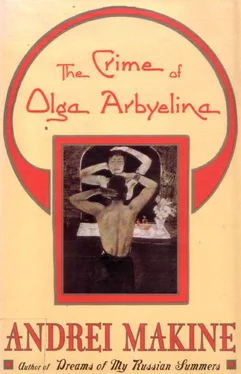She felt strong now, because she had decided not to remember. She must become a bit more stupid, be confident, talk about vacations. And it was as if she wanted to punish, wound, and destroy a being silently present within her that she forced herself to read the text of the article: "This year many foreign visitors-English, Scandinavians, Americans-plan to sample the delights of France. We owe a warm welcome to these visitors when they come to the places where for two years soldiers from their own countries fought for the liberation of Europe…"
This summery and agreeably simple world accepted her. She gave herself over to it, its joys and its gossip, with the fervor of a convert. Each new day seemed to justify her. The readers seemed happy to see her taking part in their discussions, just as in the old days.
At the end of the month she took her son to Paris. The doctor ("the French doctor" they called him, so as not to confuse him with the doctor-just-between-ourselves) examined the boy, arranged for him to be admitted to his ward, and told them the date of the operation. "The crooked leg will be straightened out under general anesthesia," she read again that same evening in the pages she could recite by heart; their technical language reassured her. She could already picture her son walking normally in a life that had become ordinary again…
After the operation, the date of which, so much dreaded in advance, arrived with surprising ease, the boy was to remain in the hospital for a number of days. And even her almost daily trips to Paris became a real apprenticeship for her in the blissful triviality of life.
Always in a hurry to get back to the Caravanserai, to the library, she had no time to see Li. It was only on July 14, thanks to the public holiday, that she could visit the photographer's little apartment…
The evening was unbearably oppressive with the smell that dusty streets have just before a storm, with a hazy, purple sky and the turmoil of leaves in brief gusts of wind. Li was still in her studio in the cellar, busy with the last clients of the day. And indeed it was only the studio that retained an air of habitability. In the main rooms the furniture had been replaced by pyramids of cardboard boxes of all shapes and sizes. On the bare walls there were countless dark punctures-left by the hooks on which pictures, photos, and icons had hung…
She waited for a moment in the miniature courtyard, surrounded by windows on several floors. They were all open, to capture every tiniest breath of cool air on that stifling evening. You could hear the sizzling of oil in a frying pan, the gurgling of water running away, the clatter of crockery, scraps of conversation, snatches of music. An aroma, compounded of roofs cooling after the heat of the day, laundry, and burned fat, hung in the darkness above the paved square of ground. She was just about to go down into the studio when suddenly she noticed, in the shadiest corner of the yard, the shrub that was struggling to grow against the wall, beneath the drainpipe. And to flower invisibly, out of sight of all those noisy windows. She went up to it and buried her face in the clusters of flowers with which it was studded. The scent was subtle. A freshness of snow… The feeling that she could enter, linger, and merge into this cold breath made her giddy. For a moment she thought she was walking through a snow-covered forest in winter, on a morning barely silvered by the dawn, in the midst of trees, sleeping but secretly aware of her presence. She was not alone. She had a companion on this slow stroll. An infinite peace filled the space that lay between their two souls…
Li called her from the studio doorway. She was leaving for Russia in ten days. All she had left to do was to pack up the last of her panels: a sailor with incredibly broad shoulders presenting a bunch of flowers to a wasp-waisted young thing and, on the other one, a naked man and woman squeezed in among a crowd in tuxedos and evening gowns.
• • •
Two days later, coming back from Paris, she ran into the doctor-just-between-ourselves. He behaved as if he just happened to be in the road that led out into the square in front of the station. She would have believed him if she had not glanced through the window of the coach a few seconds before the train stopped. She recognized this man in a brown suit. The speed with which he moved as he left the shade of a plane tree, where he had been sheltering from the sun, gave him away. The train was slowing down and through the win-dowpane she saw him watching the station exit then slightly adjusting his shirt collar…
They walked back together. Listening to him she thought that, had she not glanced through that coach window, his words would have had quite another meaning. And that he himself, the man walking beside her, chatting, animated andjovial, would have been somebody else. Yes, he would still have been the "doctor-just-between-ourselves," self-effacing and obliging. Now she was aware of the suppressed energy in him, with which he had emerged out of the shadows. And also the easy smoothness that had colored his feigned surprise: "My goodness, it's you! What fair wind has brought you my way?" Now she was seeing things she had never noticed before: his heavy and strangely unpleasant-looking cuff links, the backs of his very broad hands, covered in hairs on which little drops of sweat glistened… But, in particular, his brown, oily eyes, with which he gave her swift sidelong glances that seemed, as they slid away, to hold her prisoner in their reflection. Yes, he walked without looking at her but she felt she was held, snared beneath his eyelids.
She had no recollection of inviting him to take tea with her. And yet there he was, seated opposite her in the kitchen that still glowed with the sunset; and he was talking, only breaking off to take a little sip for form's sake. She got up from time to time, chased a bee, set about pretending to listen to him but in reality was noticing, despite herself, fresh, absurd, and mysteriously important details: his square, yellowish fingernails; his forehead that filled with wrinkles when he gave a theatrical sigh, wrinkles that went right up to his bald pate and made it less shiny… It was one of those odd moments when you sense the imminent approach of some gesture, drawing inexorably closer.
As he was leaving he stopped in the hall and kissed her hand. Or rather, without bowing, he raised her hand and pressed it for a long time to his lips. When she made a movement of impatience he caught her by the waist with unexpected agility. She drew back to avoid his face. But to her surprise he did not go for her mouth. He remained still for a moment, forcing her into this precariously off-center posture, and supporting the weight of her body arched against his palm. Clumsily she pulled herself free from him and collided with the door frame. And her shout of "Go away!" was mingled with a brief cry of pain and her hand rubbing her bruised elbow. Facing her, he smiled, massive, sure of himself. But the voice that emerged from this mass was strangely shrill, stammering, like those sentences that have been long prepared but which, when the time comes, emerge quite convoluted and breathless: "I'll come again tomorrow… Maybe we could first… Well, I know a little restaurant…"
That night her focus switched restlessly between several very different personages. The elderly gentleman who had come out from the Caravanserai several times, often at nightfall in the snow, to care for an ailing boy… The man in the brown suit who came walking toward her without noticing her and suddenly uttered a cry of joy… The man who took little sips of tea and spoke of the solitude "we must confront together"… And that other man, again, who confessed that for years he had wanted to speak to her. And as he said it, his cuff links and his hairy wrists seemed to belong to someone else. She found it impossible to reassemble all these men into one, this aging male with his smooth, tanned, bald head, who had seized her waist, already taking delight in her submissive body.
Читать дальше












